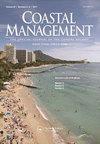Evaluating the Strategic Position of the Beibu Gulf, South China Sea
IF 1.9
4区 环境科学与生态学
Q4 ENVIRONMENTAL SCIENCES
引用次数: 0
Abstract
Abstract The Beibu Gulf of the northern South China Sea occupies an important strategic position. However, administrative areas along the Chinese coastline of the gulf do not have a significant economic value. Therefore, increasing public attention and assisting the regional government are necessary for promoting development. In this study, a conceptual model comprising geographic location, economic potential, social function, and ecological service (GESE) for strategic position analysis was constructed and further extended to a system for regional strategic position evaluation (RSPES) based on regional characteristic resources and environment. The analytical hierarchy process (AHP), fuzzy evaluation, and weighted comprehensive calculation were used to effectively apply this system to the Beibu Gulf. The evaluation scores demonstrate that the Beibu Gulf strategic position is at the second importance level and the importance rankings for the four subsystems are as follows: geographic location, economic potential, ecological service, and social function. Based on this, recommendations for the further development of the Beibu Gulf have been offered. The GESE model and the RSPES are suitable for the application in other areas, particularly coastal ocean areas, and can provide support for integrated coastal management.南海北部湾的战略地位评价
摘要南海北部的北部湾具有重要的战略地位。然而,中国墨西哥湾沿岸的行政区域并不具有显著的经济价值。因此,增加公众的关注和协助地方政府是促进发展的必要条件。本文构建了基于地理位置、经济潜力、社会功能和生态服务的战略地位分析概念模型(GESE),并将其扩展为基于区域特色资源环境的区域战略地位评价体系(RSPES)。采用层次分析法(AHP)、模糊评价法和加权综合计算法,将该系统有效地应用于北部湾。评价得分表明,北部湾战略地位处于第二重要水平,四个子系统的重要性排名依次为地理位置、经济潜力、生态服务和社会功能。在此基础上,对北部湾的进一步开发提出了建议。GESE模型和RSPES适用于其他地区,特别是沿海海洋地区,可为沿海综合管理提供支持。
本文章由计算机程序翻译,如有差异,请以英文原文为准。
求助全文
约1分钟内获得全文
求助全文
来源期刊

Coastal Management
环境科学-环境科学
CiteScore
6.00
自引率
0.00%
发文量
24
审稿时长
>36 weeks
期刊介绍:
Coastal Management is an international peer-reviewed, applied research journal dedicated to exploring the technical, applied ecological, legal, political, social, and policy issues relating to the use of coastal and ocean resources and environments on a global scale. The journal presents timely information on management tools and techniques as well as recent findings from research and analysis that bear directly on management and policy. Findings must be grounded in the current peer reviewed literature and relevant studies. Articles must contain a clear and relevant management component. Preference is given to studies of interest to an international readership, but case studies are accepted if conclusions are derived from acceptable evaluative methods, reference to comparable cases, and related to peer reviewed studies.
 求助内容:
求助内容: 应助结果提醒方式:
应助结果提醒方式:


